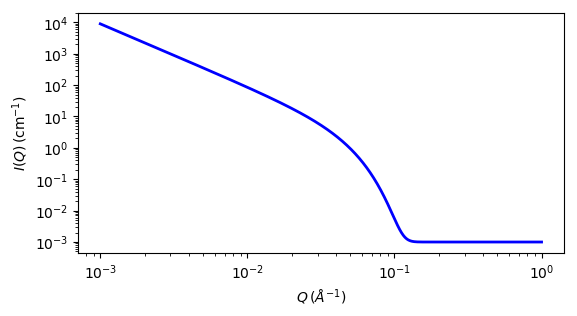adsorbed_layer
Scattering from an adsorbed layer on particles
Parameter |
Description |
Units |
Default value |
|---|---|---|---|
scale |
Scale factor or Volume fraction |
None |
1 |
background |
Source background |
cm-1 |
0.001 |
second_moment |
Second moment of polymer distribution |
Å |
23 |
adsorbed_amount |
Adsorbed amount of polymer |
mg·m-2 |
1.9 |
density_shell |
Bulk density of polymer in the shell |
g·cm-3 |
0.7 |
radius |
Core particle radius |
Å |
500 |
volfraction |
Core particle volume fraction |
None |
0.14 |
sld_shell |
Polymer shell SLD |
10-6Å-2 |
1.5 |
sld_solvent |
Solvent SLD |
10-6Å-2 |
6.3 |
The returned value is scaled to units of cm-1 sr-1, absolute scale.
Definition
This model describes the scattering from a layer of surfactant or polymer adsorbed on large, smooth, notionally spherical particles under the conditions that (i) the particles (cores) are contrast-matched to the dispersion medium, (ii) S(Q)∼1 (ie, the particle volume fraction is dilute), (iii) the particle radius is >> layer thickness (ie, the interface is locally flat), and (iv) scattering from excess unadsorbed adsorbate in the bulk medium is absent or has been corrected for.
Unlike many other core-shell models, this model does not assume any form for the density distribution of the adsorbed species normal to the interface (cf, a core-shell model normally assumes the density distribution to be a homogeneous step-function). For comparison, if the thickness of a (traditional core-shell like) step function distribution is t, the second moment about the mean of the density distribution (ie, the distance of the centre-of-mass of the distribution from the interface), σ=√t2/12.
where scale is a scale factor, ρpoly is the sld of the polymer (or surfactant) layer, ρsolv is the sld of the solvent/medium and cores, ϕcore is the volume fraction of the core particles, δpoly is the bulk density of the polymer, Γ is the adsorbed amount, and σ is the second moment of the thickness distribution.
Note that all parameters except σ are correlated so fitting more than one of these parameters will generally fail. Also note that unlike other shape models, no volume normalization is applied to this model (the calculation is exact).
The code for this model is based originally on a a fortran implementation by Steve King at ISIS in the SANDRA package c. 1990 [1].

Fig. 75 1D plot corresponding to the default parameters of the model.
Source
References
Authorship and Verification
Author: Jae-Hi Cho Date: pre 2010
Last Modified by: Paul Kienzle Date: April 14, 2016
Last Reviewed by: Steve King Date: March 18, 2016